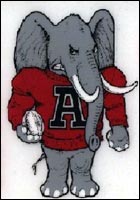By Alex Laracy
ABC Sports Online
It is understandable for one to feel
confused when catching a glimpse at the red elephant mascot at the University of
Alabama. With a nickname like the "Crimson Tide," one can't help but
conjure up images of a more aquatic, perhaps crustaceous creature as opposed to
a 5-ton circus animal to represent the school's athletic spirit.
One account of the mascot's derivation began in 1930, when Rosenberger's
Birmingham Trunk Company, whose trademark is a red elephant standing on a trunk
to signify the luggage's durability, presented red elephant good luck charms to
members of Rose Bowl-bound Alabama.
When the team, composed of predominantly large men, emerged from the train in
Pasadena with red elephant trinkets suspending from their luggage, reporters
were awed by the players' mass and quickly seized upon the insignias on their
baggage. Thus, the connection was born.
But perhaps the most widely recognized story of the red elephants' origin at
Bama is that of the field official and part-time sports columnist for the Atlanta
Journal, Everett Strupper.
This adaptation also goes back to the 1930 season when Tide head coach
Wallace Wade had assembled a powerhouse of a football team that would eventually
post an overall 10-0 record, win the Rose Bowl and the National Championship.
On Oct. 8 of that year, Strupper wrote a story on the Alabama-Mississippi
game he had witnessed in Tuscaloosa four days earlier. In that article, Strupper
marveled over the sheer mass and power of the Bama juggernaut:
"That Alabama team of 1930 is a typical Wade machine, powerful, big,
tough, fast, aggressive, well-schooled in fundamentals, and the best blocking
team for this early in the season that I have ever seen. When those big brutes
hit you I mean you go down and stay down, often for an additional two minutes.
"Coach Wade started his second team that was plenty big and they went
right to their knitting scoring a touchdown in the first quarter against one of
the best fighting small lines that I have seen. For Ole Miss was truly battling
the big boys for every inch of ground.
"At the end of the quarter, the earth started to tremble, there was a
distant rumble that continued to grow. Some excited fan in the stands bellowed,
'Hold your horses, the elephants are coming,' and out stamped this Alabama
varsity.
"It was the first time that I had seen it and the size of the entire
eleven nearly knocked me cold, men that I had seen play last year looking like
they had nearly doubled in size."
Strupper and other Atlanta newspapers grasped onto the term, and continued to
refer to the Alabama linemen as "red elephants," the color referring
to the crimson jerseys.
In following years, various fight song lyrics and fan chants featured the
reference to the red elephants. While attempts to establish other team mascots
such as the mythical god, Trident, and a giant wave crashed miserably, the
mysterious elephant fetish somehow stuck firmly.
The school still refused, however, to acknowledge the elephant as an official
mascot. In order to clear up the Bama faculty and staff's curiosity over the
origin of the ever-present pachyderm, director emeritus of alumni affairs at the
time, Jefferson Coleman, wrote a memo to legendary head coach Paul
"Bear" Bryant in 1977. In that memo, Coleman confirmed the
authenticity of the "recently uncovered documentation" that supported
the Strupper theory.
Hence, in 1979, the Alabama Student Government Association asked the
University to legitimatize the elephant as an official school mascot and give
him a name. Thus was born Big Al, the instantly recognizable sideline icon of
the Crimson Tide.
Coleman has since maintained his obsession with the "Strupper
Commission," most recently in June of 1993, when he "uncovered"
that Strupper was actually an "insurance agent-salesman" who only
"wrote one story a week about the football game he had officiated in during
the past Saturday." Coleman also insists that it was a man named Borden
Burr, who was holding the chain for Alabama, and not fans, who yelled,
"Hold your horses, here comes the elephants."
While the elephant lore that has surrounded Crimson Tide football has
generated a little more controversy than it has deserved over the years, it has
certainly provided Bama faithful with an amusing anecdote about the mysterious
land creature that has symbolized a team with an aquatic moniker.
So why does a red elephant prance up and down the Tide sidelines, revving up the
Tuscaloosa faithful on game day? Well, no one can really say for sure. School
historians verify that the red elephants have been associated with 'Bama
football since 1930, however, theories on the tradition's origin have varied
over the years.

Much
mystery surrounds the origin of the Tide's red elephant.




